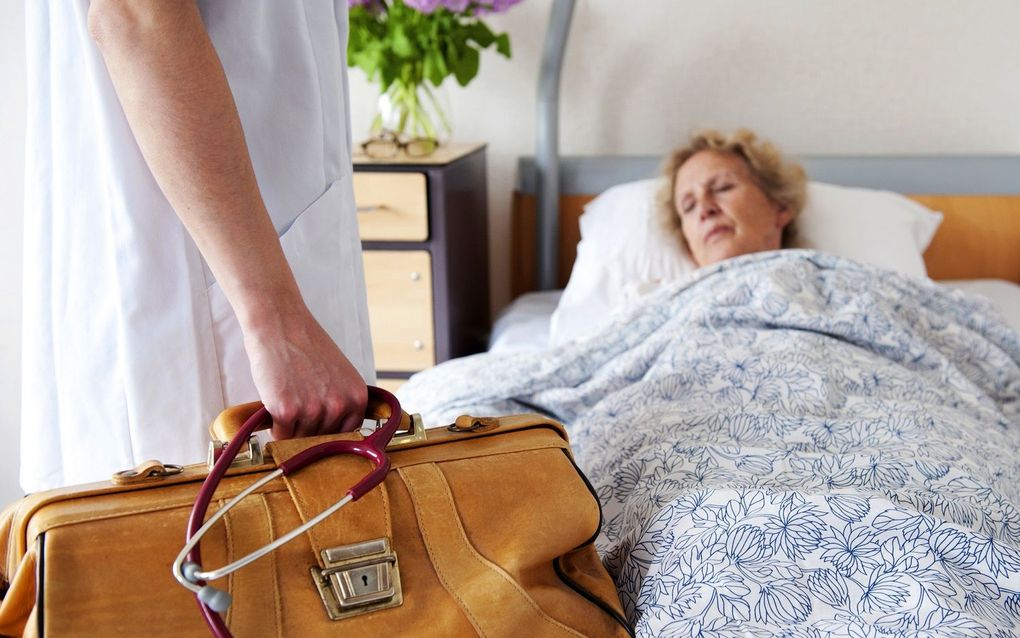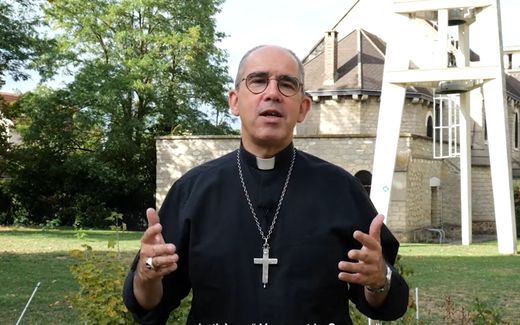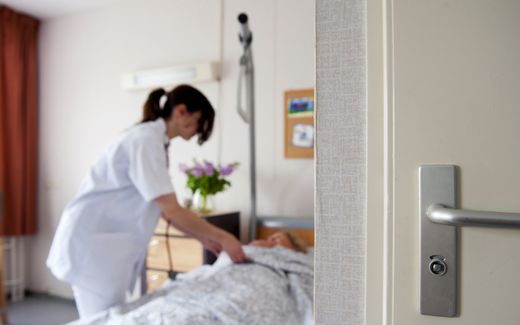How to counter the threat of euthanasia

A doctor visiting an elderly patient. Photo ANP, Roos Koole
European Union
Not all countries in the West have been eager to accept euthanasia. But the debate never dies. Speakers at the End-of-Life Symposium in the European Parliament on Wednesday agree that “voluntary killing” is a slippery slope. What should be done to turn the tide?
Alex Schadenberg, Executive Director of the Euthanasia Prevention Coalition from Canada, finds it dangerous that almost all countries legalising euthanasia do not specify "who can die and who cannot." He stresses that euthanasia and assisted suicide are often "sold to the public" as a solution to suffering. Yet, suffering is a subjective term and cannot be measured, he argues.
Language
Schadenberg is especially worried about euthanasia discussions in Italy. There the court decided that assisted suicide should be available to people who suffer physically and mentally in a way they consider “intolerable”. Such inclusive language is dangerous, Schadenberg says. "It leaves wide open who can live and who can die, as everyone experiences some level of suffering."

Therefore, the Executive Director of the Euthanasia Prevention Coalition pleads for resistance against this inclusive language. Sometimes a total ban on euthanasia and assisted suicide cannot be achieved, he acknowledges. "But the least we can do is fight against permissive language, for example, when it includes people with chronic conditions that are not terminal."
In addition, he stresses the importance of preventing the medicalisation of euthanasia and assisted suicide. "If euthanasia is seen as a medical right, it will become the right to be killed because surely, no one will oppose the right to medical care."
Compassion
Remarkable is that both sides in the euthanasia debate appeal to compassion as an argument for their stance. Kevin Yuill, professor of history at the University of Sunderland in England, points out that proponents of euthanasia and assisted suicide rely on imaginative stories about people dying a slow and painful death. That kind of compassion is problematic, he says. "Even the Nazis defended themselves by saying they were compassionate to the people they killed."
Genuine compassion, the Dutch MEP Bert-Jan Ruissen argues instead, is identifying what is behind someone's death wish. Referring to the Dutch situation, he says that close to 60 per cent of elderly people feel lonely. They live alone, are not visited often by their loved ones and perceive themselves as a burden to society, Ruissen says.

He pleads compassion in the sense of taking care of our neighbours. "It is one thing to make euthanasia illegal again. However, it is another thing to make our fellow human beings feel loved, so they do not see themselves as a burden to the ones close to them. We can tell them we want to forbid euthanasia, but if that is not followed up by love, death wishes will not disappear."
Palliative care
The culture of life should replace the current culture of death, the speakers at the symposium on the end of life agree. That means that euthanasia should be replaced by good palliative care. That is important to diminish any wish for suicide one might have, Dr Carlo Belleini, Associate Professor of paediatrics at the University of Siena, argued during the symposium. Qualitative palliative care should be holistic, taking into account the care for the whole person, whatever stage of life he or she might be at.
The quality of palliative care should not depend on the patient's location or the so-called quality of life. Treatments should not be based on the patient's subjective opinion on the quality of his life or the view of relatives. Instead, it should be tailored to the patient's real needs based on objective measurements, such as pain measurements. If these measurements show that continuing treatments leads to unnecessary suffering, that should be considered a valid reason to withhold them, Belleini argues.
When palliative care becomes polluted with bad intentions
Good palliative care is essential, Henk Reitsema, a board member of the "End of Life Care Europe", stresses at the End-of-Life Symposium. Yet, he warns that this type of care can be abused easily. "If we are not careful, palliative care can become backdoor euthanasia", he warns. Doctors have gotten accustomed to applying specific sedative treatments, even if they are life-shortening, according to Reitsema. He refers to a report that shows that in 2005, 8.2 per cent of people died from terminal sedation. In 2010, that number had risen to 12.5 per cent. Reitsema believes that this increase can only be explained if physicians use palliative sedation as backdoor euthanasia.
Instead, he pleads for strict guidelines on terminal sedation. That should only be focused on relieving symptoms, he said. "We should work long and hard to keep palliative care pure."
Currently, the quality and quantity of palliative care are insufficient, Dr Manuel Martinez-Selles, President of the Spanish College of Physicians, points out. According to him, Europe has less than half of the number of palliative care centres that the European Association for Palliative Care recommends. According to the association, there should be two centres per 100,000 inhabitants. Remarkable is that there are no units specialised in palliative care in Spain and the Benelux. In these countries, euthanasia is allowed, Martinez-Selles says.
Absolute
What are some other recommendations to battle the legalisation of euthanasia and assisted suicide? Professor Kevin Yuill from the University of Sunderland encourages pro-life people to point out inconsistencies in the reasoning for euthanasia. "For example, show that proponents of euthanasia cannot draw a consistent and meaningful boundary between people who are allowed to commit suicide and those who are not. If you are in favour of absolute autonomy, you should allow it for everyone, including children and those who might not be capable of choosing rationally."
In addition, Yuill believes that euthanasia endangers moral equality. "It is not up to us to interrogate people who express death wishes. Instead, we should insist that every human life, no matter the circumstances it finds itself in, is worth preserving and deserves respect, dignity and protection."
Slippery slope
If countries decide to step over the boundary of legalising euthanasia and assisted suicide, they take the first step on the slippery slope, speakers at the End-of-Life Symposium warn. In the Netherlands, euthanasia has been legal since 2001. When introducing end-of-life legislation, the expectation was that legalisation would create more transparency and less backdoor euthanasia and that incremental extension of euthanasia cases would be limited due to regulation.
How wrong politicians were, Henk Reitsema, a board member of "End of Life Care Europe", says during the symposium. Since 2001, the criterium for unbearable physical pain has been extended to include psychological distress. Furthermore, there is currently a proposal on the table that would allow minors under 12 years old to request the end of their life, even though they are too young to give informed consent.
The same trend can be seen in Belgium. Dr Léopold Vanbellingen, a lawyer at the European Institute of Bioethics, shows how fast the Belgian euthanasia law liberalised. Belgium legalised euthanasia in 2002. In 2014, it extended its legislation so minors could also request the end of their life without any age restrictions. In recent years, there have been a few cases where someone was allowed to choose euthanasia for a mental illness such as depression.
"What is next?" Vanbellingen asked. "People with severe dementia? People tired of living? Will decriminalising euthanasia, which became the right to euthanasia, ultimately lead to the duty to die?"
Related Articles






